1959
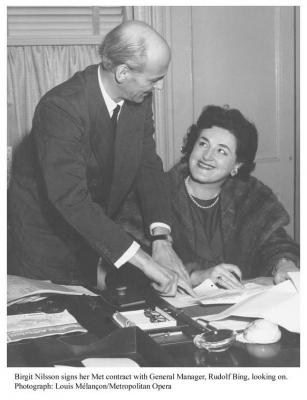
4 janvier 1959 : Turandot. Scala de Milan. Votto. Birgit Nilsson (Turandot). Mercuriali. Modesti. Di Stefano. Beltrami.
6 janvier 1959 : Turandot. Scala de Milan. Votto. Birgit Nilsson (Turandot). Mercuriali. Zaccaria. Gibin. Beltrami.
12 février 1959 : Der fliegende Hollander. Scala de Milan. Knappertsbusch. Van Mill. Birgit Nilsson (Senta). Vandenburg. Siewert. Dickie. Hotter (Note : Le rôle d’ Erik devait être interprété par Ernst Kozub, mais en raison d’une indisposition, ce dernier sera remplacé par Vandenburg).
16 février 1959 : Der fliegende Hollander. Scala de Milan. Knappertsbusch. Van Mill. Birgit Nilsson (Senta). Aldenhoff. Siewert. Dickie. Hotter.
21 février 1959 : Der fliegende Hollander. Scala de Milan. Knappertsbusch. Van Mill. Birgit Nilsson (Senta). Vandenburg. Siewert. Dickie. Neralic.
24 février 1959 : Der fliegende Hollander. Scala de Milan. Knappertsbusch. Van Mill. Birgit Nilsson (Senta). Vandenburg. Siewert. Dickie. Neralic.
1 mars 1959 : Der fliegende Hollander. Scala de Milan. Knappertsbusch. Van Mill. Birgit Nilsson (Senta). Kozub. Siewert. Dickie. Neralic.
3 mars 1959 : Fidelio. Opéra royal de Stockholm. Ehrling, Birgit Nilsson (Leonore), Saeden, Bjorling, Soderstrom, Bjorker, Kjellgren, Vikstrom. ENREGISTREMENT LIVE (extraits).
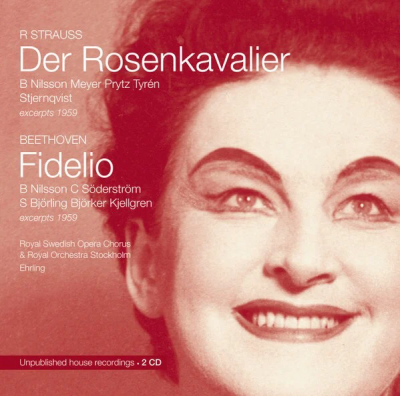
7 mars 1959 : Der Rosenkavalier. Opéra royal de Stockholm. Ehrling. Birgit Nilsson (Die Marschallin). Tyren. Dellert. Sundquist. Prytz. Kjellgren. Vikstrom. Ericson.
11 mars 1959 : Der Rosenkavalier. Opéra royal de Stockholm. Ehrling. Birgit Nilsson (Die Marschallin). Tyren. Dellert. Sundquist. Prytz. Kjellgren. Vikstrom. Ericson.
15 mars 1959 : Der Rosenkavalier. Opéra royal de Stockholm. Ehrling. Birgit Nilsson (Die Marschallin). Tyren. Meyer. Sundquist. Prytz. Lund-Christiansen. Vikstrom. Ericson.
22 mars 1959 : Aida. Staatsoper de Vienne. Von Matacik. Guthrie. Von Milinkovic. Birgit Nilsson (Aida). Vickers. Frick. Hotter.
30 mars 1959 : Die Walkure. Staatsoper de Vienne. Karajan. Vickers. Frick. Hotter. Konetzni. Birgit Nilsson (Brunnhilde). Malaniuk.
4 avril 1959 : Un ballo in maschera. Staatsoper de Vienne. Von Matacik. Poggi. Waechter. Birgit Nilsson (Amelia). Roessel-Majdan. Maikl.
8 avril 1959 : Siegfried. Staatsoper de Vienne. Karajan. Windgassen. Birgit Nilsson (Brunnhilde). Edelmann. Neidlinger. Klein. Frick. Roessel-Majdan.
19 avril 1959 : Die Walkure. Opéra royal de Stockholm. Ehrling. Hoiseth. Bjorker. Bjorling. Lund-Christiansen. Birgit Nilsson (Brunnhilde). Meyer.
28 avril 1959 : Tristan und Isolde. Scala de Milan. Karajan, Windgassen, Birgit Nilsson (Isolde), Rossel-Majdan, Neidlinger, Hotter, Heater. ENREGISTREMENT LIVE.
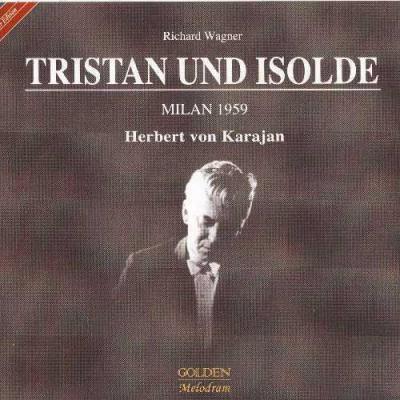
30 avril 1959 : Tristan und Isolde. Scala de Milan. Karajan, Windgassen, Birgit Nilsson (Isolde), Rossel-Majdan, Neidlinger, Hotter, Heater.
4 mai 1959 : Tristan und Isolde. Scala de Milan. Karajan, Windgassen, Birgit Nilsson (Isolde), Rossel-Majdan, Neidlinger, Hotter, Heater.
6 mai 1959 : Tristan und Isolde. Scala de Milan. Karajan, Windgassen, Birgit Nilsson (Isolde), Rossel-Majdan, Neidlinger, Hotter, Heater.
10 mai 1959 : Tristan und Isolde. Opéra de Rome. Wallberg. Windgassen. Birgit Nilsson (Isolde). Borst. Neidlinger. Gorr. Herwig.
16 mai 1959 : Tristan und Isolde. Opéra de Rome. Wallberg. Windgassen. Birgit Nilsson (Isolde). Borst. Neidlinger. Gorr. Herwig.
17 mai 1959 : Tristan und Isolde. Opéra de Rome. Wallberg. Windgassen. Birgit Nilsson (Isolde). Borst. Neidlinger. Gorr. Herwig.
20 mai 1959 : Tristan und Isolde. Opéra de Rome. Wallberg. Windgassen. Birgit Nilsson (Isolde). Borst. Neidlinger. Gorr. Herwig.
25 mai 1959 : Fidelio. Staatsoper de Vienne. Hollreiser. Windgassen. Birgit Nilsson (Leonore). Uhde. Hotter. Edelmann. Gueden. Kmentt.
28 mai 1959 : Die Walkure. Staatsoper de Vienne. Karajan. Windgassen. Greindl. Hotter. Brouwenstijn. Birgit Nilsson (Brunnhilde). Madeira.
31 mai 1959 : Siegfried. Staatsoper de Vienne. Karajan. Windgassen. Birgit Nilsson (Brunnhilde). Hotter. Neidlinger. Klein. Frick. Madeira.
2 juin 1959 : Die Walkure. Opéra royal de Stockholm. Ehrling. Svanholm. Bjorker. Bjorling. Nordmo-Lovberg. Birgit Nilsson (Brunnhilde). Meyer.
4 juin 1959 : Der Rosenkavalier. Opéra royal de Stockholm. Ehrling. Birgit Nilsson (Die Marschallin). Tyren. Dellert. Sundquist. Prytz. Kjellgren. Vikstrom. Ericson.
9 juin 1959 : Der fliegende Hollander. Staatsoper de Vienne. Bohm. Frick. Birgit Nilsson (Senta). Windgassen. Hoengen. Terkal. Wiener.
14 juin 1959 : Tristan und Isolde. Staatsoper de Vienne. Karajan. Windgassen. Frick. Birgit Nilsson (Isolde). Wiener. Uhde. Roessel-Majdan.
18 juin 1959 : Tristan und Isolde. Staatsoper de Vienne. Karajan. Windgassen. Frick. Birgit Nilsson (Isolde). Wiener. Uhde. Roessel-Majdan.
3 au 11 juillet 1959 : Turandot. Rome. Leinsdorf. Bjorling. Tebaldi. Birgit Nilsson (Turandot). Tozzi. ENREGISTREMENT STUDIO.
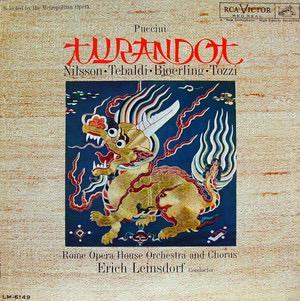
27 juillet 1959 : Tristan und Isolde. Festival de Bayreuth. Sawallisch. Windgassen. Hines. Birgit Nilsson (Isolde). Andersson. Uhl. Hoffman.
8 août 1959 : Tristan und Isolde. Festival de Bayreuth. Sawallisch. Windgassen. Hines. Birgit Nilsson (Isolde). Andersson. Uhl. Hoffman. ENREGISTREMENT LIVE.
14 août 1959 : Fidelio. Prinzregentheater Munich. Birgit Nilsson (Leonore)
16 août 1959 : Tristan und Isolde. Festival de Bayreuth. Sawallisch. Windgassen. Hines. Birgit Nilsson (Isolde). Andersson. Nocker. Hoffman.
20 août 1959 : Tristan und Isolde. Festival de Bayreuth. Sawallisch. Beirer. Hines. Birgit Nilsson (Isolde). Andersson. Uhl. Hoffman.
24 août 1959 : Un ballo in maschera. Opéra d’ Édimbourg. Ehrling. Ulfung. Saeden. Birgit Nilsson (Amelia). Lundborg. Tyren. Meyer (tournée de l’Opera de Stockholm).
26 août 1959 : Die Walkure. Opéra royal de Stockholm (Tournée à Édimbourg). Ehrling. Svanholm. Bjorker. Bjorling. Nordmo. Birgit Nilsson (Brunnhilde). Meyer.
28 août 1959 : Die Walkure. Opéra royal de Stockholm (Tournée à Édimbourg). Ehrling. Svanholm. Bjorker. Bjorling. Nordmo. Birgit Nilsson (Brunnhilde). Meyer.
31 août 1959 : Die Walkure. Opéra royal de Stockholm (Tournée à Édimbourg). Ehrling. Svanholm. Bjorker. Bjorling. Nordmo. Birgit Nilsson (Brunnhilde). Meyer.
2 septembre 1959 : Die Walkure. Opéra royal de Stockholm (Tournée à Édimbourg). Ehrling. Svanholm. Bjorker. Bjorling. Nordmo. Birgit Nilsson (Brunnhilde). Bergstrom.
7 septembre 1959 : Die Walkure. Opéra royal de Stockholm (Tournée à Édimbourg). Ehrling. Svanholm. Bjorker. Bjorling. Nordmo. Birgit Nilsson (Brunnhilde). Meyer.
18 septembre 1959 : Un ballo in maschera. Staatsoper de Vienne. Von Matacik. Di Stefano. Bastianini. Birgit Nilsson (Amelia). Madeira. Koth.
20 septembre 1959 : Un ballo in maschera. Staatsoper de Vienne. Von Matacik. Bertocci. Bastianini. Birgit Nilsson (Amelia). Madeira. Koth.
21 septembre 1959 : Tosca. Staatsoper de Vienne. Mitropoulos. Birgit Nilsson (Floria Tosca). Fernandi. Bastianini.
27 septembre 1959 : Der Rosenkavalier. Opéra royal de Stockholm. Ehrling. Birgit Nilsson (Die Marschallin). Tyren. Meyer. Sundquist. Prytz. Kjellgren. Vikstrom. Ericson. ENREGISTREMENT LIVE : compilation des représentations du 27/9 et du 17/10.
2 octobre 1959 : Un ballo in maschera. Opéra royal de Stockholm. Ehrling. Ulfung. Saeden. Birgit Nilsson (Amelia). Lundborg. Tyren. Meyer.
4 octobre 1959 ; Aida. Staatsoper de Vienne. Klobucar. Welter. Cvejic. Birgit Nilsson (Aida). Fernandi. Kreppel. Protti.
6 octobre 1959 : Tosca. Staatsoper de Vienne. Mitropoulos. Birgit Nilsson (Floria Tosca). Fernandi. Protti.
9 octobre 1959 : Un ballo in maschera. Staatsoper de Vienne. Mitropoulos. Iaia. Protti. Birgit Nilsson (Amelia). Roessel-Majdan. Maikl.
12 octobre 1959 : Die Walkure. Staatsoper de Vienne. Hollreiser. Suthaus. Frick. Edelmann. Crespin. Birgit Nilsson (Brunnhilde). Roessel-Majdan.
14 octobre 1959 : Der fliegende Hollander. Staatsoper de Vienne. Loibner. Bohme. Birgit Nilsson (Senta). Suthaus. Hoengen. Terkal. Symonette.
15-16 octobre 1959 : Enregistrement de la symphonie N° 4 + Ah, perfido (Beethoven) / Pierre Monteux, Orchestra of the Royal Opera House / Edward Downes. ENREGISTREMENT STUDIO.
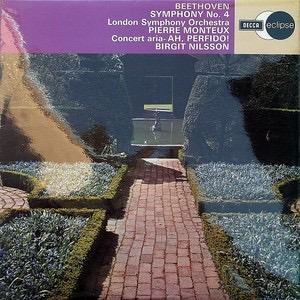
17 octobre 1959 : Der Rosenkavalier. Opéra royal de Stockholm. Ehrling. Birgit Nilsson (Die Marschallin). Tyren. Dellert. Sundquist. Prytz. Lund-Christiansen. Vikstrom. Ericson.
20 octobre 1959 : Un ballo in maschera. Opéra royal de Stockholm. Ehrling. Ulfung. Hasslo. Birgit Nilsson (Amelia). Lundborg. Tyren. Ericson.
28 octobre 1959 : Turandot. Opéra de Chicago. Gavazzeni. Izzo. Price. Di Stefano. Mazzoli. Nielsen. Birgit Nilsson (Turandot).
30 octobre 1959 : Turandot. Opéra de Chicago. Gavazzeni. Izzo. Price. Di Stefano. Mazzoli. Nielsen. Birgit Nilsson (Turandot).
4 novembre 1959 : Un ballo in maschera. Opéra de Chicago. Bartoletti. Foldi. Harrower. Stahlman. Di Stefano. Gobbi. Kramarich. Birgit Nilsson (Amelia)
7 novembre 1959 : Un ballo in maschera. Opéra de Chicago. Bartoletti. Foldi. Harrower. Stahlman. Di Stefano. Gobbi. Kramarich. Birgit Nilsson (Amelia)
13 novembre 1959 : Der fliegende Hollander. Opéra de Chicago. Von Matacik. Greindl. Curzi. Neralic. McKenzie. Birgit Nilsson (Senta). Tobin.
16 novembre 1959 : Der fliegende Hollander. Opéra de Chicago. Von Matacik. Greindl. Curzi. Neralic. McKenzie. Birgit Nilsson (Senta). Tobin.
21 novembre 1959 : Der fliegende Hollander. Opéra de Chicago. Von Matacik. Greindl. Curzi. Neralic. McKenzie. Birgit Nilsson (Senta). Tobin.
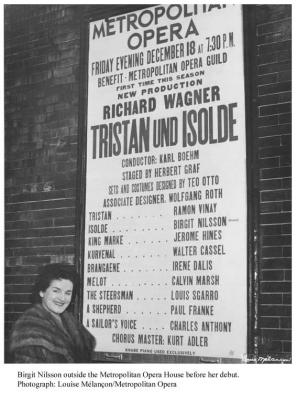
18 décembre 1959 : Tristan und Isolde. Metropolitan Opera de New York. Bohm. Liebl. Birgit Nilsson (Isolde). Cassel. Dalis. Hines. Marsh.
Review: Front Page account of The New York Times by Howard Taubman (This debut also was front page in The Herald Tribune)
BIRGIT NILSSON AS ISOLDE FLASHES LIKE NEW STAR IN 'MET' HEAVENS
Swedish soprano's voice in debut is compared with Kirsten Flagstad's Best
Birgit Nilsson filled the Metropolitan Opera House last night with the glory of the finest Isolde since the unforgettable days of Kirsten Flagstad two decades ago.
In her New York debut the Swedish soprano assumed one of the most demanding roles in the repertory and charged it with power and exaltation. With a voice of extraordinary size, suppleness and brilliance, she dominated the stage and the performance. Isolde's fury and Isolde's passion were as consuming as cataclysms of nature.
Before the first act was over a knowing audience at the Met's new production of "Tristan und Isolde" was aware that a great star was flashing in the operatic heavens. At the end of the act the crowd remained in their seats, waiting for Miss Nilsson to take a solo bow. And when she came out alone, they roared like the Stadium fans when Conerly throws a winning touchdown pass.
It was an audience that knew its Wagnerian manners. It did not break into applause during the performance, but again at the end of the second act it manifested its enthusiasm with sustained applause and cheers for the newcomer.
At the final curtain the audience began a thunderous demonstration. As the principals came out for repeated bows all eyes were on the soprano. An ovation was building up for her, and it broke out into a thunderous shout as she came out alone.
People seemed disinclined to go home. The lights in the theatre were dimmed, but men and women throughout the house remained near their seats, applauding for Miss Nilsson's return. After more than fifteen minutes of plaudits, the enthusiasts let Miss Nilsson return to her dressing room.
Like Miss Flagstad, who created a similar sensation in her 1935 debut, Miss Nilsson relied first and foremost on the voice. Her soprano has apparently limitless reserves of tone. In a range well over two octaves, no note loses its quality, and high C's emerge with stunning impact.
Although she is small and trim compared with the run of Wagnerian sopranos, Miss. Nilsson can make her voice soar over the fortissimos of a large orchestra in full cry as if it were jet-powered. Her singing is beautifully focused, always in the center of the tone. Not so darkly colored as Miss Flagstad's huge voice, Miss Nilsson's has a gleaming refulgence. It can be whitish, to use the jargon of the vocal trade, but it can glow with warmth.
Miss Nilsson can do just what she wishes with this instrument. She can subdue it to a wisp of tone and she can modulate phrases with subtlety. She has a sure grip on the emotional curve of one of opera's most challenging roles.
The new soprano, who has sung extensively in Europe, including Bayreuth, the Wagnerian shrine, as was as in San Francisco and Chicago, also knows how to act. She moves with poise and dignity. She does not stress the tenderness in Isolde, but even that element in the character comes through in the voice.
Miss Nilsson was born in Karup, grew up on a farm and studied music in Stockholm. She made her debut as Lady Macbeth in Verdi's "Macbeth" at the Royal Opera in Stockholm twelve years ago. From the Italian repertory she moved into German, turning eventually to the imposing Wagnerian roles, which her gifts as a dramatic soprano made almost imperative. In a time of limited candidates for the most difficult roles of the repertory, she stands as a dominant figure in the world of opera.
Miss Nilsson's arrival was bound to take precedence over all other elements in this new "Tristan," but there were other values. Most impressive of these was Karl Boehm's conducting.
His is a vigorous, dramatic conception. He is painstaking in his regard for instrumental textures and balances. One can hear subtleties in the pit often obscured in routine readings. And how the Met orchestra played! Rhythms are incisive. Some conductors favor more leisurely tempos, but Mr. Boehm's choice of a vivid pulse has its merits.
One's only reservation is that he holds the orchestra back just a shade at the climaxes. With an Isolde like Miss Nilsson he can let the thrilling Wagnerian waves of sound flood the theatre. This soprano will ride them triumphantly.
Mr. Boehm has restored some of the cuts usually made in "Tristan" at the Met, particularly one in the Love Duet. With an incandescent performer like Miss Nilsson this did not seem to lengthen a long, long opera at all.
The Tristan was Karl Liebl, a German tenor, who made an unimpressive debut last season and who stepped in on this occasion for the indisposed Ramon Vinay. Though he is no Heldentenor, Mr. Liebl did better than anyone had a right to expect. He managed his light voice with reasonable effectiveness. He has no magnetism as a performer, and his voice is not built for a long pull, but he bravely carried out his assignment.
In the first act duet the performance went well. In the Love Duet things were not ideal. Here the performance was occasionally like a ship that had lost its delicate equilibrium, riding proudly when Miss Nilsson sang and listing a little when Mr. Liebl took over or joined her.
The rest of the well-balanced cast was American. Irene Dalis was an intelligent, sensitive Brangaene; her naturally rich voice was a little hollow at times. Walter Cassel was a sturdy, affecting Kurvenal. Jerome Hines was both regal and movingly human as King Marke. Charles Anthony as the sailor, Paul Franke as Melot, and Louis Sgarro as the steersman made much of small parts.
Herbert Graf's staging had a notable and telling simplicity. Teo Otto's sets with their dash of surrealism were fundamentally old hat; for generations the Met has had a fatal tendency to opt for styles in design long after they became passé. The new production was a gift of Mrs. Elon Huntingon Hooker from her four daughters.
In recent years Wagner's music-dramas have had few performances at the Met. Cassandras declared that Wagner was finished. He is far from finished. There is nothing wrong with him that a sovereign singer like Miss Nilsson will not help to cure.
23 décembre 1959 : Tristan und Isolde. Metropolitan Opera de New York. Bohm. Vinay. Birgit Nilsson (Isolde). Cassel. Dalis. Hines. Marsh.
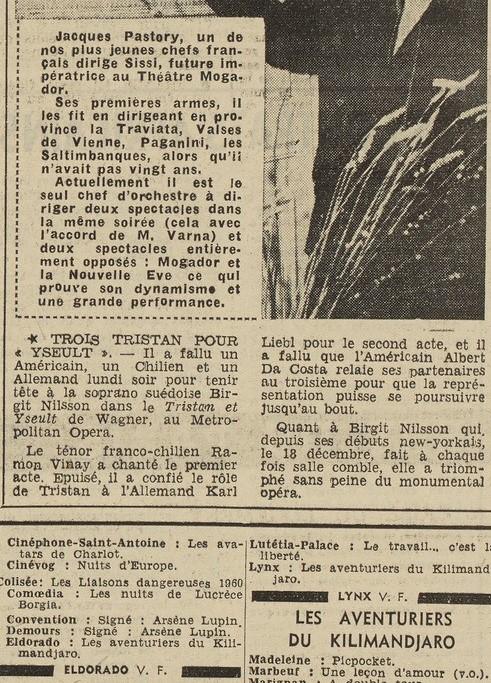
28 décembre 1959 : Tristan und Isolde. Metropolitan Opera de New York. Bohm. Vinay (acte 1), Liebl (acte 2), Da Costa (acte 3). Birgit Nilsson (Isolde). Cassel. Dalis. Hines. Marsh.
Review by John Briggs for the New York Times
NILSSON HAS THREE TRISTANS - ONE PER ACT
Ailing Vinay, Liebl, and Da Costa All appear at Met
An impresario's nightmare came true for Rudolf Bing yesterday. The Metropolitan Opera has only three tenors who can sing Tristan in "Tristan und Isolde." With that opera scheduled for 7:45 PM., each of the three tenors announced one after another that he was too ill to sing.
To complicate matters further, the Isolde was Birgit Nilsson, the Metropolitan's bright new Scandinavian star, and the house was sold out to the last seat and last square foot of standing room. If "Tristan" were canceled, nearly $22,000 worth of operagoers were going to be unhappy.
After a series of frenetic phone calls a compromise arrangement was worked out. Each tenor thought he would be strong enough to last for one act. Accordingly, the Tristan for Act I was Ramon Vinay, for Act II, Karl Liebl, and for Act III, Albert Da Costa.
Mr. Bing's troubles began at noon when Mr, Vinay reported that he was hoarse and wanted to cancel. It was Mr. Vinay who was originally scheduled for the performance. His health, however, has been poor for several weeks. He had missed the dress rehearsal and then the premiere of the new production on Dec. 18, and Mr. Liebl had stepped in to replace him. Yesterday he was asked to repeat his stand-by role.
At 2 o'clock Mr. Liebl called back to report that he was in bad voice and did not believe he could finish a whole performance. The Metropolitan turned to Mr. Da Costa, who has been recovering from an illness.
At 4 o'clock Mr. Da Costa phoned from his teacher's studio. He had been trying out his voice, with unpromising results He did not feel equal to the occasion.
It was then that the Metropolitan worked out the compromise of having each tenor sing one-third of the part.
Punctually at 7:45 Mr. Bing, looking a bit more harassed than usual, stepped before the Metropolitan's gold curtain.
"Ladies and gentlemen," he said, 'Miss Nilsson is very well. However, we are not as fortunate with our Tristans. All three are indisposed."
He then explained the unusual problem and the unusual solution. His speech was received with laughter and applause by the audience, which already had surmised from the three names on the call boards on which the Metropolitan announces last minute cast changes, that something out of the ordinary was going on.
The performance began on schedule, amid cracking of jokes by the smooth-running backstage crew, which took it as part of the day's work. One wag came backstage with a report that Karl Boehm refused to conduct with only one Isolde. Another suggested that the opera should be renamed "Der Saengerkrieg im Cornwall." ("The Song Contest in Cornwall" is also a switch on the subtitle of "Tannhaeuser," or "Der Saengerkrieg in der Wartburg.")
A stagehand's voice was heard from the flies asking: "You got somebody covering for me up here? I don't feel so hot."
"This is a catastrophe," muttered a more serious onlooker, "and it's being treated as a joke."
During the performance Dr. Leo P. Reckford, who looks after the throats of a number of Metropolitan artists, was backstage, He nodded approvingly when Mr. Vinay took one high note in half-voice, transposed another an octave lower.
At the end of the first act, as a special token of the Metropolitan's gratitude, there was a. solo curtain call for Mr. Vinay. The house gave him an ovation, later paying the same tribute to Mr. Liebl and Mr. Da Costa, who also took solo bows.
Sweating profusely, Mr. Vinay came offstage and announced himself as a candidate for "President of the Bug-of-the-Month Club."
Photographers were waiting to get a picture of Miss Nilsson with her three Tristans. Mr. Liebl was photographed wearing a gray tweed overcoat and tights. He could not don the rest of the costume for Act II, until Mr. Vinay had taken it off from Act I.
Mr. Da Costa, wearing the Act III costume, which differs from that used in the first two hurried up to the roof stage with Dr. Herbert Graf, the "Tristan" stage director, as soon as the picture-taking was finished.
Mr. Da Costa sang the last act of "Tristan" on Feb. 1, l958, when Mr. Vinay faltered.
But he had never sung the complete role at the Metropolitan, and had not yet appeared in this season's newly staged version. He had, however, attended all the rehearsals and, with Dr. Graf's last minute coaching performed quite convincingly in the last act.
Bystanders at the opera last night could not recall a precedent for three artists singing the same role in a single performance, although on numerous occasions a part has been begun by one singer and finished by another.
Although Walter Cassel, last night's Kurwenal, showed no signs of fatigue. Ralph Herbert, the Metropolitan baritone who doubles as stage director, offered to fill in for him in Act II if needed (Kurwenal in Act II has only a single line: "Rette dich, Tristan").
Miss Nilsson was to all appearances still fresh as the performance drew to its conclusion. Heard in other roles were Jerome Hines, Irene Dalis, Calvin Marsh, Louis Sgarro, Paul Franke and Charles Anthony.
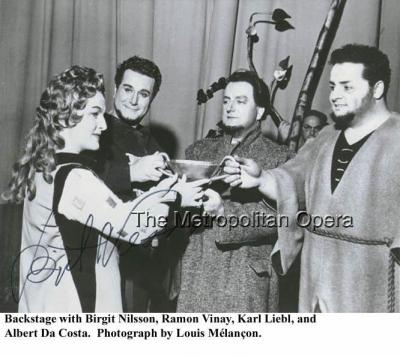
Date inconnue : Don Giovanni. Vienne. Leinsdorf, Siepi, Birgit Nilsson (Donna Anna), Valette, Price, Corena, Van Mill, Blankenburg, Ratti. ENREGISTREMENT STUDIO.
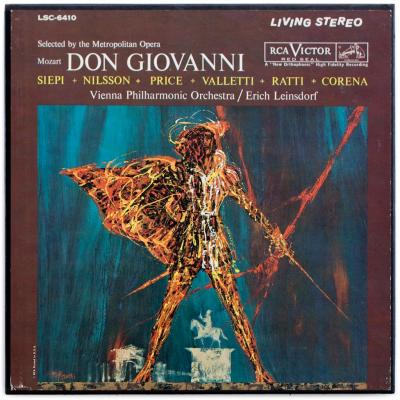
Mise à jour : 20230517 Pierre Marchais